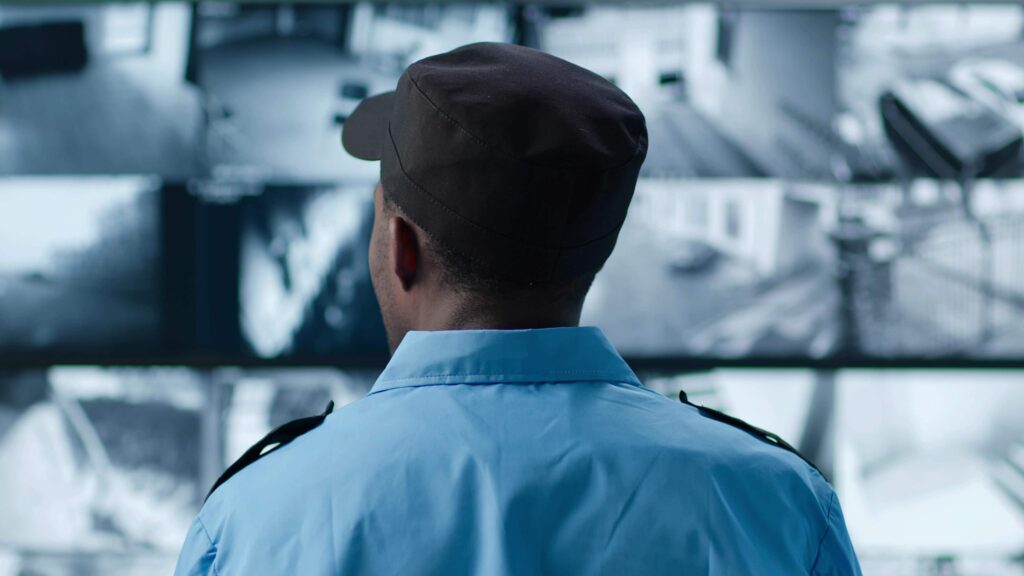What is Remote Guarding?
Remote guarding uses a combination of security cameras, advanced analytics, and the internet remotely to oversee and manage job site security. It is also known as remote surveillance and virtual guard monitoring and is a new approach to security.
ValleyGuard Video Monitoring: Visit Our Video Monitoring Page
What Can Remote Guarding Do?
Remote guarding is used for video intervention, video verification, virtual access control, and 24/7 live surveillance.
With video intervention, remote guards can talk directly to criminals, trespassers, and other bad actors over loudspeakers. This method is an effective way to deter criminal activity at any location.
Related Post: Virtual Guard Monitoring FAQs
Video verification lets the remote guard verify crimes in progress before notifying the local police or a patrol response service. This verification process reduces unnecessary police dispatches and increases police response times.
With virtual access control, the remote guard manages access to restricted areas on or near your job site and can intervene via loudspeaker to scare off people not authorized to be there.
Related Post: Remote Video Monitoring for the Equipment Rental Industry
They can also manage access to lobby areas, maintain visitor records, and lock and unlock doors remotely.
Remote Guarding vs. Security Guards
Typically, remote guards are stationed far away from the facilities they’re assigned to protect. They spend their day clearing events and alerts posted to their queue by the video management system installed at customer locations.
Related Post: What’s So Great About Proactive Video Monitoring?
To clear alerts, they review video footage, verify suspicious activity, and act by intervening via audio-talk down or dispatching the local police department.
On the other hand, security guards work onsite inside guard houses, parking lots, or entryways. They patrol their assigned sites regularly, looking for indications of suspicious activity on which to observe and report.
Related Post: Remote Video Monitoring for Contractors
Patrolling also maintains a ‘uniform presence’ throughout their facility, which helps to discourage would-be bad actors and toughens the job site’s overall security profile.
Adaptation of Remote Guarding
Although remote video monitoring isn’t a new technology, progress in several related technologies allows the remote guard to be a cost-effective method for security.
Artificial intelligence (AI) and machine learning (ML) advancements have consistently improved video analytics inside modern commercial security cameras. These technologies allow cameras to identify cars and people with remarkable accuracy.
Related Post: Remote Video Monitoring for Construction
Like AI and ML, picture and image resolution improvements allow cameras to capture high-quality, clear images. Night-color cameras “colorize” nighttime images so well they’re almost indistinguishable from images captured in daylight.
High-speed internet allows remote guard services to transmit video streams from a monitored site to the guard’s location.
So, with all these technologies combined, the remote guard can clearly see and verify people, vehicles, or animals.
Pros and Cons of Having a Remote Guard
Remote guarding is flexible because you can use it to replace onsite guards or to supplement one or two guards responsible for a large site.
Related Post: Remote Video Monitoring for Film & TV Production
In general, the positives are:
- Reduced labor costs because fewer onsite guards are needed.
- The ability to relay current information to emergency services.
- The capacity to prevent crimes proactively rather than just responding to them.
- The power to cover a large area with fewer people.
- It’s a highly effective alternative to hiring onsite security guards.
Although it’s flexible, there are a few cons, which are:
- Not having onsite personnel to react spontaneously to unforeseen events.
- Although the system is recording 24/7, down internet connections may delay the ability to review footage.
Related: Remote Video Monitoring for Summer Retail Security
Who Should Consider Remote Guarding?
You should consider remote guarding if you manage/own the following:
- Construction sites containing expensive tools, materials, and machines
- Sizeable retail shopping parking lots.
- Commercial vehicles vulnerable to frequent catalytic converter thefts
- Cannabis retail stores and grow houses.
- Warehouses and Distribution Centers
- Car Dealerships,
Wrapping Up
Remote guarding has emerged as a groundbreaking solution for job site security. It uses a combination of security cameras, sophisticated analytics, and internet connectivity to remotely manage and oversee security operations.
This innovative method serves various purposes, including video intervention, video verification, virtual access control, and continuous live surveillance.
Through real-time communication via loudspeakers, remote guards can deter criminal activities by directly engaging with potential wrongdoers.
And it is a cost-effective alternative to traditional security guards.
By considering remote guarding, companies can tap into a versatile security solution that effectively addresses contemporary challenges, redefining how security is maintained and ensuring safer environments for all.
- Proactive vs. Reactive Video Monitoring Solutions - September 8, 2023
- What Is Remote Guarding and How Does It Work? - September 6, 2023
- How CCTV Catches Southern California’s Catalytic Converter Thieves - October 4, 2022

